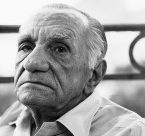, Clarice Lispector and João Cabral: An Unprinted Story. IMS Clarice Lispector, 2015. Disponível em: https://site.claricelispector.ims.com.br/en/2015/09/16/clarice-lispector-e-joao-cabral-uma-historia-tipografica/. Acesso em: 27 July 2024.
Understanding that literature is also a kind of health, as Deleuze would say, João Cabral de Melo Neto would open a small press in the 1940s while he was in Spain working as vice-consul. In a statement to the Cadernos de Literatura Brasileira he says: “I was having health problems and the doctor advised me to do gymnastics. Instead of doing Swedish Gymnastics, I decided to buy a hand-operated press. Working on it was almost the same thing as doing exercise.”
The hand-operated press would give rise to the workshop “The Seamless Book,” in which Cabral would print fourteen books, all poetry, from Manuel Bandeira to Charles Baudelaire, including Vinicius de Moraes, Joaquim Cardoso, and the Spanish writers Alfonso Pintó and Juan Ruiz Calonja, in addition to two books of his own, Psicologia da composição (Psychology of Composition) and O cão sem plumas (The Featherless Dog).
To debut his printer, Cabral would try to convince Clarice Lispector. At the time, the author was preparing the novel The Besieged City and the tragedy “The Choir of Angels.” The poet from Pernambuco seemed to prefer the play: “I am awaiting ‘The Choir of Angels.’ You speak so fabulously about it to me that my expectations are growing. Though I am certain you will like it when printed on good paper.”
The idea of a work by Clarice inaugurating “The Seamless Book” likewise excited his friend Manuel Bandeira, who wrote to Cabral: “If your printer begins with Clarice Lispector, what could be a better way to begin?”
Although the publication of Clarice by the printer was valued by two of the most important poets in Brazil, she declined the invitation. “I only regret not beginning with something of yours,” Cabral wrote.
The first book by “The Seamless Book” was, in the end, Psicologia da composição, by João Cabral de Melo Neto himself, but for a purely technical reason: “It took me a while to get it right and in order for Manuel’s [Bandeira’s] book [Mafuá do Malungo], which was in the machine, not to be damaged, I did mine. (…) It is undeniably the most difficult task of all to successfully print.”And the play that Cabral wanted, “The Choir of Angels,” would be published only in 1964 in the book Foreign Legion, by the Editora do Autor, with the title “The Woman Burned at the Stake and the Harmonious Angels.”







